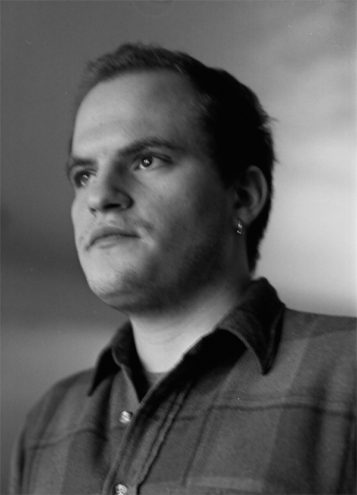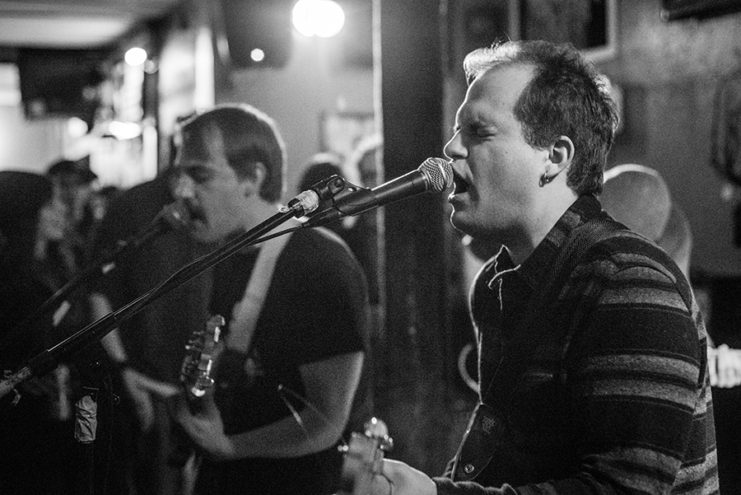Quinn Henry Mulligan


Sitting down to Quinn Henry Mulligan’s (formerly of Fanno Creek) latest project is like being granted a chance to read a dear friend’s journal of the past decade. Rarely do we get to see so deeply inside the life of a human. Mulligan’s ambitious new twelve-albums-in-twelve-months project lets us in, showing us the cracked, disfiguring process time works upon a heart, and the brief moments of clarity and peace that stick in us like bubbles in stained glass.
Drawing from the best of a several hundred song pool written over the past decade, the albums present an artist burning to get them off his chest and onto tape. The first two so far, January and February, diverge in style, a course Mulligan intends to maintain, if not so much for the sake of the listener as for the fulfillment of a prolific and matured personal artistry now unleashed. From the lullaby harmonies sung for a friend slowly breaking in “Adam, Sleep,” to the defiant vulnerability of a woman trying to understand the burden of her freedom in “Okay,” January uses memorable but direct acoustic guitar alongside Mulligan’s deft, powerful voice to tell stories of quiet urban survival. February shows another side to his project by diving into a heavier, driving, at times even jazzy sound, with tracks such as “Changing the Season” and “In My Room,” and enlists the help of a few other musicians on trumpet, saxophone and accordion.
Both albums together show that Mulligan’s orchestration thrives equally within psychedelic rock and traditional folk, without either context ever being allowed to displace the vulnerable clarity of his words. He is an artist who refuses to hide behind obscurity or irony. The sheer scope of his twelve album project commands attention, and those who are eager for a fresh talent will find real gratification as it unfolds further in the months ahead. The first two albums are free to listen to on his website, www.quinnhenrymulligan.com. If you haven’t had shivers on the back of your neck in awhile, then get after this.
ELEVEN: You’ve embarked on one of the most ambitious musical projects I’ve heard about. What is it exactly that you’re attempting?
Quinn Henry Mulligan: After Fanno Creek ended, I spent a good year of just working, and since I was 15 I’ve identified as being a musician, someone who plays concerts, and it was the first time in my life I was doing nothing musical, not recording, nothing. It was really difficult reckoning with the reality of, if I’m not doing any music, then who am I? I was talking to my brother about it and he said, “Well why don’t you try to record everything you’ve done in the past?” And he put me to the challenge of recording twelve albums in twelve months. That’s kinda the genesis of it. A big aspect of it is just being a better artist, musician, learning to stick to deadlines. Doing everything that I didn’t do well in Fanno Creek, just trying to be better at those things. Better at marketing. Just being creative again, something I felt like I’d lost and wanted to recapture.
11: So explain what the project actually consists of.
QHM: The project has a few major points. Of course do an album a month, working from demos I’d built up since I was 20. We’re also trying to do one narrative music video per month, preferably a couple live videos as well. We’re also gonna hopefully be starting a YouTube channel at some point regarding stuff that’s interesting about the project and the process. Main point is to get the videos done and have my brother be more active in the filmmaking as well.
11: Tell me about the role your twin brother Finn, who’s a professional videographer and director, plays in the project?
QHM: He’s essentially managing it, keeping everything on task, cracking the whip. When I’m mixing, I’ll bring everything in the livingroom and he’ll sit with me and say, “No that sounds stupid,” or “That sounds sweet.” He’s doing all the videography, he built the website, together we’re doing the marketing, the emails. All the tasks for the manager and the producer he’s doing.
11: How many songs are you intending to get through this year?
QHM: I’ve got at least ten per album lined up, but I’ve got around another 150 or more that won’t make it. So I’ve got 250 songs to draw from.
11: Obviously some of them are going to be better than others. How are you going to make all of them worth putting on an album?
QHM: They were all written and recorded over a long period of time, ten or eleven years. And at the time, in those moments, I put a lot of attention and hard work into the actual songwriting. The ones that I choose will be the best of the big old batch. I’ve found that probably a quarter of them I’ve rewritten since recording them for this project.
11: Some of these songs are nearly a decade old. What’s it been like rediscovering them? Do they still feel relevant to you?
QHM: That’s actually one of the strangest things about this project so far. I’m finding that I can still make them relate to what I’m going through in my life. It’s like going back and talking to 23-year-old Quinn, and having that person tell you about what you’re going through currently. Sometimes you find that you thought of things in a much healthier, more interesting way back then. I’ve realized the present is not all that different from the past.
11: Where do you draw inspiration from in life?
QHM: I think by and large my songs are my way to deal with things I’m confused about or have an issue with. Mostly that’s been interpersonal relationships, money, trying to be a productive human being, to be a good person. Trying to know more about the place I’m in, my place in the world.
11: One of the most personal songs on January is “Someone’s Son,” which is about your estranged father. Could you talk about the events in your life that inspired the lyrics?
QHM: My dad was a Vietnam vet with really bad PTSD. He was also a terrible alcoholic, unfortunately. Really good heart, but he had a hard time being a functional person. And because of that it did not work out with my mom and they became estranged when I was a couple months old. I didn’t know anything about him until I was 15, when I realized he’d written a book, and I contacted the publisher and got in touch with him. So we started a relationship when I was 15, and he was on the level for awhile, able to be in contact, but I still got phone calls from him when he was drunk, and I didn’t want to talk to him, didn’t want to hear him like that. It was the worst. It made me think, “When’s he just gonna disappear again.” That being said, we had some amazing conversations. The first time I’d met him it was extremely bizarre ‘cause I’d grown up with all these thoughts of what I would say to my dad when I first met him, would I tell him off, give him a big earful? But when I met him it was more like I was hanging out with my mom, who raised me. It was very familiar, very surprising. Then when I was 17 he got hit by a car and died.
11: You mentioned once that you and your brother were considering making a documentary about this project. Is that still on the table?
QHM: Definitely. Already with the first two months of this project there have been moments where it’s gotten really intense, been really stressful work for a few days and then it’s done, and then it starts up a week later. And I think we might be doing some sort of documentary to focus on the bigger story of it, because it’s easy to get lost in the sections. I think having a record, even if it’s just for us, of what this experience will be like, going through twelve months, twelve albums, could be interesting if enough comes of it that we think is worth watching and isn’t just us bickering about how to release an album.
11: The two albums released so far, January and February, differ dramatically at points, with January having a more stripped down acoustic sound, and February being fuller, electrified, using a greater range of instruments and featuring a few other musicians. What’s the plan from here on in terms of how the albums will sound?
QHM: Organizing people within the two week time period when I’m actually recording these albums is really difficult. So I think moving forward I’m gonna do one with a lot of musicians on it, more complicated compositions, bigger elements, and then one that’s more stripped down. A lot of these songs I have demo’d-out are pretty bare bones acoustic, so I think doing one-on one-off will probably be the direction I’m gonna go. That being said, I want to make sure that the mellower, acoustic albums don’t all sound the same. I want them to feel like they have their own distinct personality, so I’m trying to choose songs in terms of themes and maybe the instruments I was using at the time. It’s interesting going back to these olds demos because I’ll have one moment where I was really interested in a particular chord progression, or this tuning, or these instruments. So there are groups of songs already that have really similar feels. We’ll see, but the plan is to not have every album be a huge production. It’s just too much to do, too much work organizing everyone. That being said, the more people that get involved the easier that kind of thing will be. If someone down the line says they want to get involved and play on one of these albums then that’d be awesome.
11: What are you looking forward to the most with the next album, March?
QHM: I’ve got about six songs, bare bones recorded right now. With this one it’s more of a challenge. It’s more subdued. It’s way more straightforward, so I want to find a way to make sure they’re all unique and interesting, and the whole thing feels cohesive. I’m trying to decide what production elements I can use to draw something out of each of the songs to achieve that. I’m excited to dive into a more limited palette. I’ve hit some brick walls, but brick walls are good. They make you think outside of the box.

11: What are your plans for performing these songs?
QHM: Starting this week, I’m gonna start doing a bunch of open mics to get a feel for how I want the songs to be performed, but the ultimate goal is to get a band together, at least four people, so we can have somewhat consistent shows, at least one a month. I want to do a big show at the mid-way point with as many musicians as I can get my hands on, as well as a big one at the end.
11: Where do you hope to be at the end of the year when this project is finished?
QHM: The ultimate goal is to be in a place where it’s not difficult to force myself to be productive. To be able to just sit down and work on music as if it were a 9 to 5, and just be better at forcing myself to work, to be artistic, mostly because I’m a much happier person when I’m creating things.




